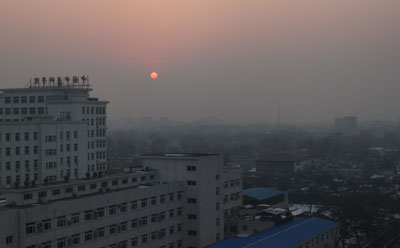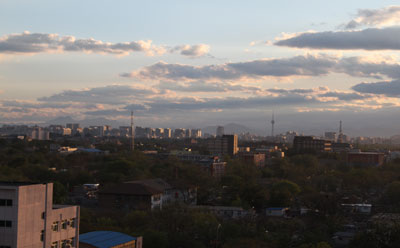I Can't Breathe

A Typical Beijing Sunset
I picked my apartment for the view. I had high hopes that I would get to enjoy it, as there had been a noticeable improvement in Beijing air quality since the 2008 Olympics. I imagined a year of sitting in my enclosed balcony, gazing westwards over central Beijing, and enjoying breathtaking sunsets over mountain peaks. I should’ve known better.
Yahoo manages to sum up Beijing weather best by their one-word forecast: smoke. Because smoke is exactly what the air in Beijing is. It hurts your lungs, leaves a grimy film on your skin, irritates your eyes and restricts visibility.
On rainy days back home in Los Angeles, my elementary school used to play a film titled “All Summer in a Day” about a classroom of children who live on Venus, where they only get to see the sun once very seven years. I used to always wonder what those children must have felt living in perpetual darkness, longing for the day the clouds parted and they could see the sun. After living in Beijing for the past three and a half years I can comfortably say that I know how those poor Venusians must have felt.
The Chinese government is well aware of the pollution problem in Beijing, but its efforts to quell pollution levels have proved futile in the face of modernization. During the Olympics Beijing implemented a policy which only allowed even and odd number license plates on the roads on alternate dates. The measure was successful; I saw more consecutive blue sky days during the Olympics then I had ever seen in Beijing up until then, or since.
Post-Olympics Beijing altered the traffic policy and made it so that every car had to stay off the road for one day every workweek, again according to their license plate number. Unfortunately this policy has not been successful; instead of carpooling, or taking public transportation, families are merely purchasing a second car to avoid the inconvenience of not being able to drive one day a week.
With a rising middle class with expanding purchasing power it seems unlikely that the Chinese appetite for autos will ebb. In the first four months of 2010, over 250,000 cars were sold, bringing the total number of cars on Beijing roads to 4 million. It is no wonder that Beijing recently topped the IBM list of cities with the worst “commuter pain”.
Officials have made other efforts to improve air quality by shutting down factories and getting rid of coal-heaters in Beijing homes. Yet in a New York Times article, the Director of the Institute of Public and Environmental Affairs in Beijing, Ma Jun is quoted saying that the dust that enters the Beijing air due to the large number of construction projects offsets the government’s efforts to control pollution.
The crux of the problem is how to balance the desire for economic growth with the need for breathable air. At the moment growth is winning, and as a result, lungs are losing. One out of four deaths in China is due to lung disease. On a recent visit to the hospital for an employee health check I had a lung x-ray taken. When my results were ready, the technician nervously told me that I better show it to a doctor. When I told the doctor about the technician’s urgent manner, he glanced at my x-ray, shrugged his shoulders and said, “Oh, that’s nothing. That’s just from smoking.” Unfortunately, I don’t smoke.
China Daily and The New York Times have both recently run articles on the topic of rich-Chinese emigrating to western countries. One of the emigrants interviewed cited her desire for a “pollution-free environment” as one of her reasons for wanting to leave China. I sympathize.
Despite the scars on my lungs I have hope for the future of Beijing air. Monday, China announced that it would shut down more than 2,000 highly polluting factories in Beijing. And recently the results of a survey backed by the Beijing Municipal Environmental Protection Bureau reported in the Global Times has shown that of 1700 Beijing residents aged 16 to 25 surveyed, 87 percent wanted to volunteer for environmental protection projects. If the government could get those residents to start carpooling to work, maybe I’ll be able to enjoy more sunsets.

What the Future May Hold
The views posted here belong to the commentor, and are not representative of the Economic Observer |
Interactive
Multimedia

- EEO.COM.CN The Economic Observer Online
- Bldg 7A, Xinghua Dongli, Dongcheng District
- Beijing 100013
- Phone: +86 (10) 6420 9024
- Copyright The Economic Observer Online 2001-2011
















